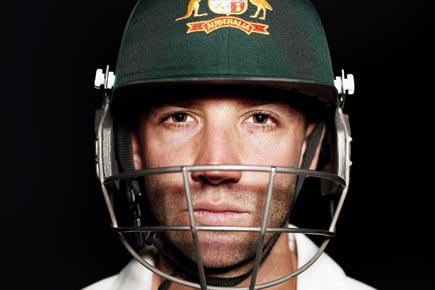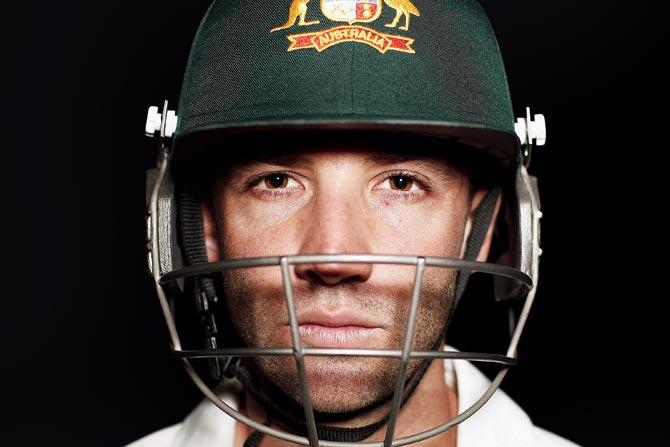Recently, Joe Burns was subjected to a verbal attack during the Sheffield Shield which the media described as the 'ultimate sledging examination'. The same could have happened to Hughes


ADVERTISEMENT
 Two years apart, two almost-identical scenarios. November 2014 - Phillip Hughes batting against NSW in a Sheffield Shield match, trying to impress the selectors enough to win a spot in the First Test against India. October 2016 - Joe Burns, batting against NSW in a Sheffield Shield match, trying to impress the selectors enough to win a spot in the First Test against South Africa.
Two years apart, two almost-identical scenarios. November 2014 - Phillip Hughes batting against NSW in a Sheffield Shield match, trying to impress the selectors enough to win a spot in the First Test against India. October 2016 - Joe Burns, batting against NSW in a Sheffield Shield match, trying to impress the selectors enough to win a spot in the First Test against South Africa.
We all know how the first game ended. In tragedy and ultimately in controversy. The coronial inquest into Hughes' death was extraordinary in that the Hughes family broke ranks with the cricket establishment and aired their concerns about the alleged sledging and short-pitched bowling that was directed at Phillip. Bearing in mind that the evidence given at the inquest was often contradictory, it is not possible that all witnesses could have been telling the truth. Some witnesses claimed they overheard a NSW player admitting to sledging Hughes with the threat to kill, however rhetorical or fatuous those sort of on-field sledges may be. This was flatly denied by the player himself and other participants. Perhaps, instead of accusing anyone of deliberate untruths, under oath mind you, the convenient excuse might be that different people had differing recollections of the same event. Bottom line? According to the NSW players, there was no sledging at all in that game, despite the high stakes nature of Hughes' innings in the context of fighting for a possible Test spot. Apparently.
In the more recent game involving Burns, who made a stylish century in that match vs NSW and is now back in the Australian team, various Australian news agencies ran with the story that Burns was subject to the "ultimate sledging examination" from a team that included his now team-mates David Warner, Mitchell Starc, Steve Smith, Josh Hazelwood, Peter Nevill and Nathan Lyon. Here is a batsman (Burns) recently dropped from the Test team, desperate to make a big score to push his case for a recall, playing against a NSW team containing many of the same players who played in that fateful match at the SCG and so publicly showed their grief in that gripping Test vs India at the Adelaide Oval in 2014 who was apparently given a thorough "working over" by his now team-mates. Why? Because that's the way Sheffield Shield cricket is played. No matter that it's mate against mate - when you walk out to bat, expect a verbal barrage from the opposition, even some of your best friends. As Burns himself said "you want to see guys playing the same way for their States as you do for your country." That's one of the strengths of this famed domestic competition. It breeds tough, battle-hardened cricketers who thrive on being verbally tested. It prepares you for international cricket. Apparently.
And that's also where the similarities end with the infamous Hughes match vs NSW. Despite Hughes also auditioning for a spot in the Test team, against the same opposition (NSW), the evidence presented to the coronial inquest was that there was no sledging at all in that particular game! How curious. At the time that Hughes was batting, the NSW team had no inkling of the tragedy that was about to unfold, no premonition that he would be struck in the neck and yet, for some inexplicable reason, contrary to the way Sheffield Shield cricket is usually played, even when it's mate against mate, not a word was said to Hughes, contrary to the time-honoured tradition of Australian domestic cricket. Under oath, we had two different versions of the same incident, one of them being that on this momentous day, even without any foreknowledge that Hughes was soon to die on that cricket pitch, there was no sledging. Just that day, maybe even just that session, for reasons we will never know, there was a moratorium on sledging. They were all as quiet as mice. Apparently.
Like Burns, Adam Voges is one of the gentleman on the circuit. I can personally attest to that - both of them thoroughly likeable and decent fellows. In a high-stake game with Test spots up for grabs and tensions running high, is it plausible, that like the infamous 'Hughes match', there was no sledging whatsoever when Voges batted against Tasmania today? Is it plausible, like in the minutes leading up to Hughes' fatal blow, the players had a gut feeling that Voges, like Hughes, a fine player of fast bowling, was going to get hit in the head today? Concussed and dazed, he will take no further part in this game and it could spell the end of his Test career.
Is that why there was presumably no sledging today, unlike a few weeks ago at the Gabba when Burns was torched? To a neutral observer, it seems odd that only on days when players cop a serious blow to the head, those days are sledge-free zones. Coincidentally. Apparently.
The NSW coroner, Michael Barnes, placed in an impossible situation, unable to distinguish between two polemically opposite recollections of the same incident, had some difficulty reconciling the truth. "The repeated denials of any sledging having occurred in the game in which Phillip Hughes was injured were difficult to accept. Hopefully the focus on this unsavoury aspect of the incident may cause those who claim to love the game to reflect upon whether the practice of sledging is worthy of its participants. An outsider is left to wonder why such a beautiful game would need such an ugly underside" he said.
Unless one of the witnesses later confesses to a memory lapse and changes their testimony, we will never know for sure if the Hughes family's insistence that Phillip was sledged in the moments leading up to his death was fact or fiction. In good faith, we must believe that for some bizarre reason, this particular innings, despite being almost identical to the recent situation that Burns found himself in, was unusually quiet and devoid of any sledging, despite recent evidence pointing to the fact that this practice continues unabated, even after the promise that Hughes' death would not be in vain.
So what is the legacy of the Hughes tragedy? After the initial outpouring of grief, the very public displays of heartache and the promise that Phillip's death would herald a new spirit of cricket, what's really changed? Mate against mate, state against state, Test match spot up for grabs...fast forward two years to 2016 and it's business as usual. Sledging is an integral facet of the game, every game. Except on that fateful day in November 2014, Your Honour.
 Subscribe today by clicking the link and stay updated with the latest news!" Click here!
Subscribe today by clicking the link and stay updated with the latest news!" Click here!






